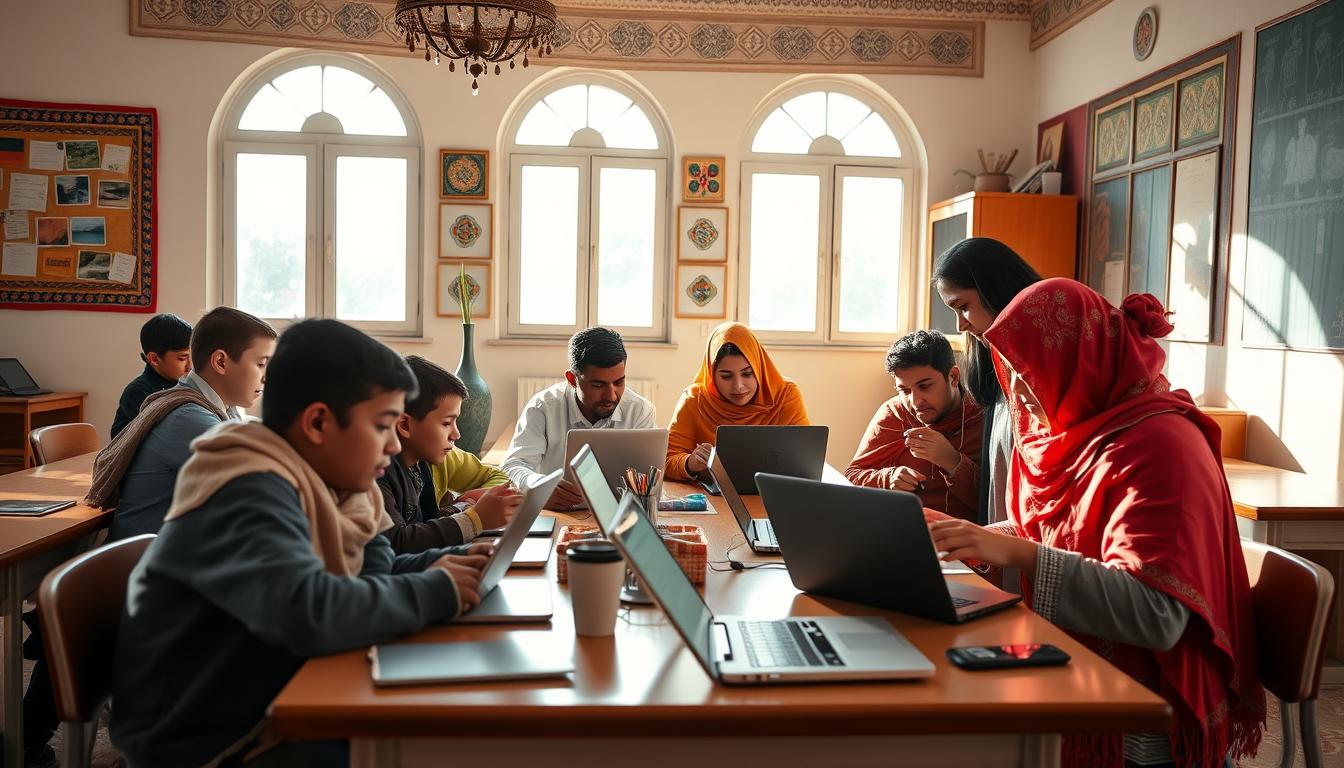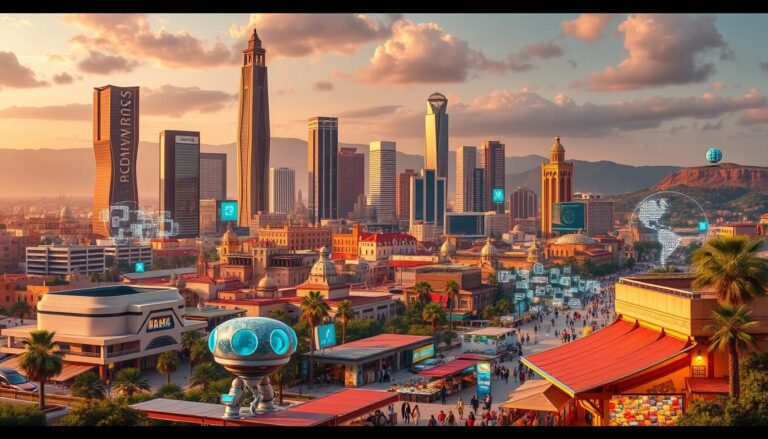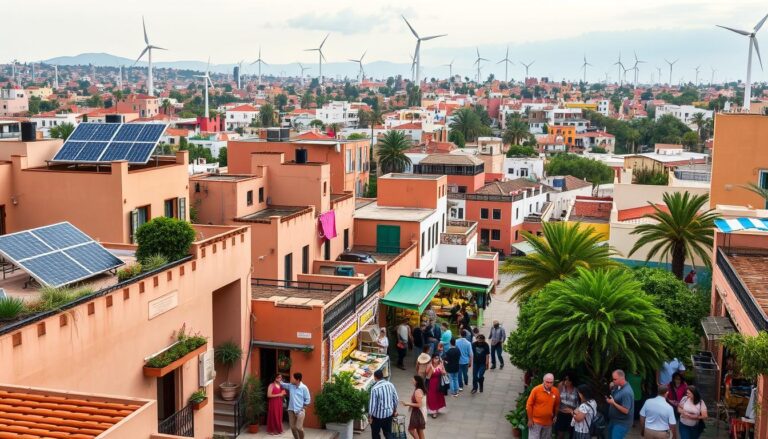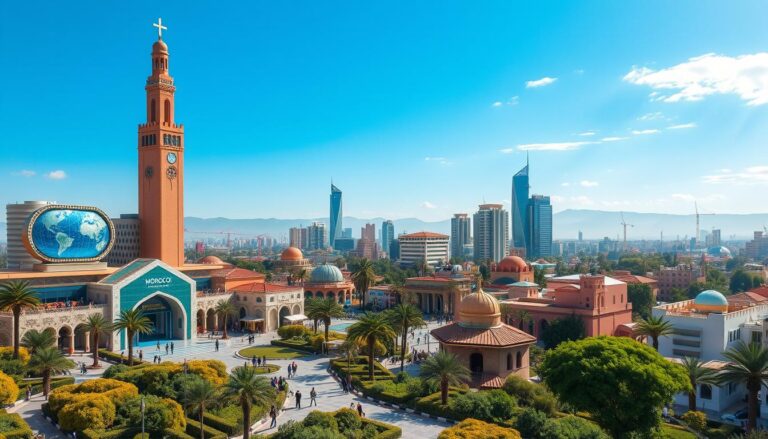What would the future of Morocco look like with a digitally proficient workforce driving its socio-economic progress?
Digital skills development in Morocco is not just a trend. It’s a crucial strategy for the nation to align with global advancements and local necessities. With an internet penetration rate of an impressive 93%, Morocco is on a striking path toward digital transformation. Ranked fourth among MENA countries in digital competitiveness by the European Center for Digital Competitiveness in 2020, the nation is fostering a digitally literate populace ready to face contemporary challenges.
In an effort to integrate ICT in education, substantial investments have been made. A $500 million approval by the World Bank in 2020 supported financial and digital inclusion reforms. In 2022 alone, 2,700 administrative procedures were successfully digitized, showcasing Morocco’s commitment to enhancing tech skills and digital literacy. Moreover, the opening of a new R&D facility by Oracle underscores the country’s potential in the tech industry.
Morocco’s ambition extends beyond infrastructure. Public-private partnerships, such as those with French telecoms company Orange, are providing vocational training opportunities. These opportunities build robust digital competencies. As the General Directorate of National Security (DGSN) of Morocco celebrated winning the “African Excellence E-Government Award” in 2022, the importance of digital literacy became crystal clear.
With institutions like the training facility 1337 in Khouribga offering programming and computer science courses, Morocco ensures that tech skills enhancement is accessible and impactful. Digital skills development in Morocco is setting a new precedent. It proves that a well-coordinated effort can turn aspiration into reality.
As we delve deeper into the various initiatives, partnerships, and training opportunities, you’ll discover how Morocco is nurturing a future-ready workforce.
The Rise of Digital Skills Initiatives
Morocco is working hard to improve digital skills across the country. UNESCO, Huawei, and the government are teaming up to make this happen. They’re adding digital training to schools to prepare the next generation.
Key Players in Digital Skills Development
UNESCO and Huawei are leading the charge in digital skills. Morocco started making literacy programs digital in 2017. They’re using mobile apps and training 10,000 teachers by 2025.
“By enhancing the digital skills of literacy trainers, Morocco aims to empower individuals and foster sustainable community development.”
Partnerships and Collaborations
Huawei and UNESCO are working together in Morocco. Huawei’s Seeds for the Future program has helped 2.8 million people worldwide. It shows their commitment to digital education.
This effort is part of a bigger plan to improve digital literacy. It’s making sure schools teach the skills needed for today’s world. This partnership is helping build a strong digital education system in Morocco.
Tech Skills Training in Morocco
The role of tech skills training in Morocco is vital. The government has launched vocational tech programs Morocco to bridge the skills gap. With a budget of USD 1.1 billion, they aim to train 100,000 young people each year in digital fields.
This is a big jump from the 14,000 trained in 2022. The government wants to employ 240,000 people in the digital sector. They also plan to triple the number of digital graduates at public universities by 2027.
The project aims to create 130,000 new jobs. A special program offers 550 scholarships, each worth 7,000 dirhams monthly for three years. This is to boost research in advanced technology and digitization.
With over 70 courses and resources, Morocco is on the right track. They have held 104 webinars and registered over 45,000 citizens for digital skills training. This shows they are actively building their digital future.
Currently, 54 partners are supporting this initiative. This shows the strong teamwork needed for success. The Smart Africa Scholarship Scheme is also helping by supporting African tech leaders.
“We are not just teaching skills; we are paving the way for a brighter digital future for Morocco,” highlighted a key spokesperson involved in the initiative.
These steps are crucial, especially since startups in Africa got only 0.5% of funding in 2023. By aligning education with industry needs, Morocco is set to lead in digital transformation in Africa.
Online Learning Programs for Digital Literacy
Digital technology is changing the world fast. Morocco is focusing on making its people digitally literate. This effort aims to improve digital skills across the country.
Government and Private Sector Efforts
The Moroccan government is leading the charge with the Moroccan Agency for Digital Development (ADD). Since 2015, ADD has supported digital growth in areas like education and healthcare. They’ve also launched a program to give digital tools to students and teachers.
ADD works with companies like Oracle to offer training. They teach students, teachers, and business owners. This helps a lot of people get the digital skills they need.
Accessible Platforms for All
Morocco wants everyone to have access to digital learning. They’ve made online programs that help bridge the digital gap. ADD also offers certifications in new tech areas like Oracle Cloud and AI.
They’ve also set up “Code 212” centers in universities. These centers provide training in digital subjects. This way, Morocco is working towards a society where everyone can succeed in the digital world.
IT Certifications: A Pathway to Employment
In Morocco, getting IT certifications is key to landing good tech jobs. The Morocco Digital Academy offers top-notch training. It covers a wide range of courses that meet today’s tech needs.
The Academy focuses on areas like Augmented & Virtual Reality, Cybersecurity, and more. It also teaches essential skills like Project Management and Leadership. After finishing specific courses, learners get IT certifications from Coursera and IBM.
These certifications prove you have the IT skills needed for jobs. The Academy also offers practical training. This includes hands-on labs and workshops to help you stand out in the job market.
The Cybersecurity program teaches about today’s protection technologies. The Internet of Things program introduces learners to platforms like Raspberry Pi. Full Stack Web Development and Data Science courses give students the knowledge they need for IT roles.
Graphic & UI UX Design courses focus on creating user-friendly designs. The Digital Transversal Skills Certificate is a fast track to digital careers. It prepares students for entry-level jobs or further studies in computing.
This approach combines IT certifications with professional training. It’s a strong way to move up in Morocco’s growing tech industry.
Coding Workshops: The New Wave of Education
In today’s fast-paced digital world, coding workshops are key educational tools. They teach people essential coding skills and boost creativity and problem-solving. Morocco’s coding bootcamps are changing tech education, helping many start successful careers.
Types of Coding Bootcamps Available
There are many coding bootcamps for different learning levels. They cover a wide range of programming languages and technologies:
- Beginner Bootcamps: Great for newbies, these introduce coding basics like HTML, CSS, and JavaScript.
- Intermediate Bootcamps: These focus on more complex skills, such as Python, Ruby on Rails, and full-stack development.
- Advanced Bootcamps: For experienced coders, these cover advanced topics like machine learning, algorithms, and data science.
Programs like CodeABot and Gebeya offer specialized training in software development, data science, and AI. They help fill the tech talent gap.
Success Stories of Participants
Success stories from coding workshops show their impact:
“Before CodeJIKA, I knew nothing about coding. Now, I’m a junior developer at a tech company, thanks to JavaScript skills.”
The CodeJIKA program aims to teach 100,000 students coding. It’s open to all skill levels. Students get digital certificates, celebrating their tech achievements.
Many Morocco coding bootcamp graduates have landed top tech jobs. Their stories prove the power of focused coding workshops.
Software Development Bootcamps
In Morocco, software development bootcamps are key for learning tech skills. Le Wagon, for example, has a 4.96 rating from 3,465 reviews. They offer 16 courses worldwide, showing their global impact and student satisfaction. These programs are essential for tech training in Morocco.
GOMYCODE has a 4.44 rating from 10 reviews, with 21 courses in Africa and the Middle East. Jedha is known for its 4.98 rating from 306 reviews, showing high student satisfaction. These ratings highlight the effectiveness of their training and the positive feedback from students.
Ark-X Academy, though new, offers free bootcamp programs and courses in Morocco. This focus on accessible education is vital for areas where money might limit tech education.
People who join these bootcamps often get jobs in high-demand fields. For example, MERN developers are in great demand. Full-stack developers also get higher salaries because they can handle many parts of software development.
- Full-Stack MERN program requires a Bac+2 minimum.
- Full-Stack Java / Angular program requires a Bac+5 minimum.
These programs stress the importance of being on time and regular. They also create a team learning environment. This helps students do well in the tech world.
The training includes real-world projects. Courses like “SoapUI for API Testing” and “Unit Testing with C#” are offered. Students enjoy the hands-on learning, including team exercises and discussions.
Feedback from these bootcamps is mostly positive. Comments like “Trainer knows very well about the teaching materials” and “[I] enjoyed everything as it is all new for me” show their value. These testimonials prove the importance of software development bootcamps in Morocco.
Digital Literacy Courses: Bridging the Knowledge Gap
Digital literacy is key in modern Morocco. It ensures everyone can use technology well. Morocco is working hard to teach its people the digital skills they need to succeed.
Importance of Digital Literacy in Modern Morocco
In Morocco today, knowing how to use technology is important. The ITU Academy offers over 700 courses every year. This helps a lot of people learn about digital skills.
The Digital Transformation Centre Initiative has helped over 364,000 people. This shows how important digital literacy is. The digital economy is growing fast, and Morocco wants to keep up.
Programs Tailored for All Age Groups
Morocco has programs for everyone, no matter their age. This makes sure digital literacy is for all. The ITU Digital Skills Toolkit helps create plans for digital skills.
By 2023, many jobs will need new skills. Morocco is preparing people for these changes. This is very important for the future.
Success stories show the impact of these efforts. In Lebanon, 18% more people found jobs after learning digital skills. Morocco is making progress in digital literacy, helping everyone in society.
Morocco Tech Industry: Opportunities and Challenges
Morocco’s tech industry is growing fast. This growth comes from new technologies and a need for skilled tech workers. The National Digital Development Strategy 2020-2025 wants to make Morocco a digital leader by 2030. It aims to improve digital infrastructure and encourage new tech ideas.
Emerging Technologies and Their Impact
New technologies like artificial intelligence and the Internet of Things are changing Morocco’s economy. They are making the country more digital. Programs like LafargeHolcim Morocco’s “Connected Classrooms” aim to train 22,500 digital experts by 2027. This shows Morocco’s dedication to creating tech-savvy people.
Projects to digitize public services and help small businesses are also important. They make digital services better and improve how businesses work. These efforts are key to growing Morocco’s tech industry and building a strong digital economy.
Job Market Demand
The demand for tech jobs in Morocco is rising. To meet this need, many programs are being started. For example, 144 digital programs will be introduced in 12 universities. This will help meet the digital sector’s growing needs.
The Ministry of National Education, Preschool, and Sports is also setting up a digital lab. This will help improve digital skills even more. These efforts show Morocco’s commitment to becoming a top digital economy in the region.
Skill Development Initiatives by UNESCO and Huawei
UNESCO and Huawei have joined forces to improve digital skills in Morocco. They aim to train 10,000 teachers by 2025. This effort supports Morocco’s goal for quality education for everyone.
The program started with a four-day workshop. It brought together experts, educators, and civil society reps. This shows how important ICT is in education.
Training Literacy Teachers
The main goal is to give teachers the digital skills they need. The training is part of UNESCO’s global literacy effort. It’s not just for teachers but also for trainers and managers.
Similar programs have been successful in countries like Bangladesh and Egypt. This shows the initiative’s global impact.
Integration of ICT in Education
ICT is key to this project. The Moroccan National Agency for the Fight against Illiteracy supports using digital tools. Huawei’s Seeds for the Future program helps make this happen.
Huawei has trained over 2.83 million people in 150 countries. Their experience is crucial for this project. It aligns with UNESCO and Morocco’s goals for digital literacy.
With intelligent and digital technologies playing an ever-increasing role, initiatives like these help bridge the digital divide, making quality education accessible to all.
Interactive Digital Center and Virtual Reality Training
The Interactive Digital Center (IDC) shows Morocco’s strong focus on tech and education. It was started with big names like Mohammed VI Polytechnic University and EON Reality. The IDC uses top XR tech to make learning better in many fields.
The Role of XR Technologies in Education
XR tech is changing how we teach. At the IDC, they use Augmented, Virtual, and Mixed Reality for training. They’ve worked with top schools to make these XR modules.
So far, 240 professors have learned how to use AVR tech to improve their teaching. This tech is also helping professionals in fields like car engineering and flying. Over 797 people have seen better learning thanks to XR.
They’re also adding XR to college degrees. This is thanks to partnerships with schools like Mohammed VI Polytechnic University School of Architecture.
Successes and Future Prospects
The IDC in Ben Guerir is a big deal. It has the latest AVR tech. Since it started, 152 experts have learned AR and VR. This makes Morocco a leader in tech.
The Virtual Reality and Innovation Academy (VRIA) has held training. These courses adapt to new situations, even during tough times. So far, 110 young Moroccans have finished their training, with more starting soon.
USAID is helping with $3 million. This is part of a $29 million budget. Ministries like OFPPT and the Ministry of Tourism are also interested. They want to use XR in schools all over Morocco.
Looking to the future, the IDC is key for Morocco’s education. The country is working hard to be a top place for tech and learning.
Conclusion
Morocco’s digital transformation journey has seen many milestones. The government and private sectors have worked together. They started the Moroccan e-Government Program and the eMaroc 2010 Strategy.
These steps helped build a strong base for digital administration and services. The Digital Morocco Plan and Maroc Digital 2020-2025 strategy show Morocco’s aim to lead in digital services in the Middle East and Africa.
Tech skills initiatives in Morocco cover a wide range. They include online learning, IT certifications, digital centers, and virtual reality training. These efforts aim to improve digital literacy and ensure growth in digital education.
Programs like coding workshops and software development bootcamps have empowered the youth. They give them the skills needed for today’s job market.
Despite challenges like the digital divide, Morocco is making progress. Projects like digital classrooms and mobile learning apps are helping. The government is working with UNESCO and Huawei to bridge gaps and make the population tech-savvy.
Morocco aims to digitize all administrative transactions by 2030. It wants to ensure 100% of structures are connected via a unified interface. This shows a bright future for digital education in Morocco.
In summary, Morocco’s digital transformation journey is ambitious and forward-thinking. Challenges still exist, but there’s a clear path to a more digitally inclusive future. Morocco’s commitment to tech skills and education reforms is promising. It aims to become a leading African technology hub.
Source Links
- The Digital Cooperation Organization
- Bringing Business to Morocco | Digital Skills Accelerator Africa
- Morocco – ICDL Global
- Initiative to advance literacy learning in Morocco launched
- Initiative to advance literacy learning in Morocco launches
- Digital Morocco 2030: the national digital transformation strategy
- Morocco
- Moroccan Agency for Digital Development (ADD) – My Business Organization
- Oracle-Backed Training Portal Officially Launched in Morocco – Forbes Morocco
- Morocco Archives – World Learning
- Our program – MDA | Morocco Digital Academy
- Certificate in Digital Transversal Skills
- Code for Change’s CodeJIKA Initiative Aims to Empower 100,000 Students during Computer Science Education Week 2023
- Africa Tech Schools – A catalog of technology universities, incubators, accelerators, colleges, innovation hubs, coding bootcamps and coworking spaces in Africa.
- The Best Casablanca Coding Bootcamps
- Jobintech Program
- Software Engineering Training in Morocco
- Interactive Programme – The ITU Digital Skills Forum 2024
- World Bank Document
- Digital Transformation Center Morocco | BMZ Digital.Global
- Digital transformation in Morocco: Connected schools to modernize education – Resilient Digital Africa
- UNESCO to empower Moroccan literacy teachers with technology
- Huawei Announces Several Digital Talent Initiatives for 2024 at the Huawei Talent Summit
- Building a Vibrant Talent Ecosystem to Empower Industries – Huawei Enterprise
- Interactive Digital Center | Morocco | Fact Sheet | U.S. Agency for International Development
- Interactive Digital Center Fact Sheet
- Morocco: The Impact of the Digitization of Public Services
- The Gender Digital Divide in Morocco — فِكر – Fekr

The Editorial Team is a passionate group of Morocco enthusiasts dedicated to sharing the beauty, culture, and wonders of this captivating country. With diverse backgrounds and a deep love for travel, we strive to bring you engaging and informative content that inspires your Moroccan adventures. From uncovering hidden gems and sharing local insights to exploring mouthwatering cuisine and showcasing the vibrant lifestyle, our team is committed to providing you with valuable resources and exciting stories that enhance your exploration of Morocco. Join us on this journey as we celebrate the rich heritage and unforgettable experiences that make Morocco truly special.





